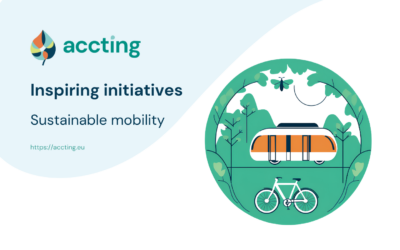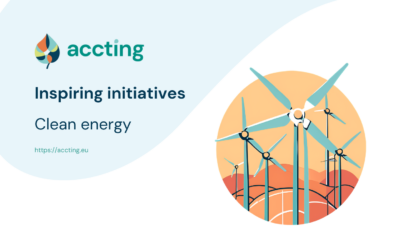Green Digital Accessibility 2024
Bridging Sustainability and Accessibility
in the Green Transition:
Future Transformations in the Digital World
2-3 December 2024, Barcelona and Online
ACCTING Panel
Towards a fair and inclusive Green Deal: Insights from European research
The European Green Deal sets out ambitious goals to achieve a fair and green transition without leaving anyone behind. However, emerging research indicates that existing policies and practices largely fail to incorporate gender and other complex inequalities. Hosting presentations focused on the policy areas of disaster management, mobility, and food security, the panel’s presenters illustrate – through comparative case studies – what changes in behaviours of individuals in different positions of intersectional vulnerability are underway, and what changes are hindered. In doing so, the presentations highlight various factors that enable and hinder individual behavioural changes and changes in social practices within and across policy areas, such as access to certain kinds of material resources and social bonds, ideology and values, and reliance on technological and political solutions. The insights give further valuable insights on the effects which the politically envisioned green transformation has and will further have on various kinds of marginalised and vulnerable communities. On this backdrop, the panel further discusses to what extent digitalisation can complement and contribute to achieving a just and socially inclusive green transition.
Panel chairs
Carolin Zorell is Associate Professor in Political Science at Örebro University, Sweden, and leading the work on the theoretical framework of the EU Horizon 2020 project ACCTING: For a fair and inclusive Green Deal. Her research interests are in political participation, environmental politics, and sustainable consumption, with a particular focus on the study of diffusion processes of attitudes, norms, and behaviours. In several ongoing national and international research projects, she explores how structures, policies, and social dynamics form attitudes and behaviour.
Sofia Strid is Associate Professor and Director of Research Studies in the Department of Sociology and Work Science, University of Gothenburg, Sweden. She has worked extensively on developing concepts and methodologies for theorising and measuring inequalities, with a focus on violence, crisis, and sustainability. Sofia is the Scientific Coordinator of the EU projects UniSAFE: Gender-based violence and institutional responses (2021-2024), RESISTIRÉ: Reducing gendered inequalities (2021-2023), and ACCTING: For a fair and inclusive Green Deal (2022-2025), and Sweden PI of ST4TE: Strategies for just and equitable transitions in Europe (2024-2027).
Presentations
Planes and Goats: Imagining a Multispecies Response to Disasters in the Age of Techno-fixes
International organisations, such as the Intergovernmental Panel on Climate Change (IPCC) and the UN, have come to recognise the importance of local knowledge and agency in climate change adaptation, and disaster preparedness and response (e.g., van Bavel et al. 2022; UNDRR 2019). However, our research conducted in four countries (Italy, Sweden, Portugal, Turkey) shows that the inclusion of civil society groups and other local communities into the local, regional, and national policies on disaster management is still very limited. Further, the notion that climate-induced disasters can be most effectively encountered with the advancements in technological tools and approaches is increasingly dominant. What scholars call “the technical fix” (Nightingale et al. 2020) leads to further marginalization of the local and indigenous solutions to disaster, reinforcing the dualistic approach to nature and culture, where the latter is presumed to have power over the other.
We illustrate this using the example of Turkey. Based on the narrative interviews with forest engineers, retired officers at the state institutions, forest policy scholars, as well as the members of the fully nomadic goat herders, Sarıkeçililer in Turkey, we reveal the limitations of ‘the technical fix’ approach during and in the aftermath of the major forest fires in 2021-22. The government´s failure to provide immediate and adequate response to fires increased the public fascination with the firefighter planes and helicopters, making them central in disaster response. However, we argue that the dominance of technological means in public and policy approach to disasters hide the role of other actors, most prominently of local multispecies communities, in preventing, mitigating, and recovering from forest fires. Sarıkeçililer nomadic community and the goats that accompany them help us imagine an alternative disaster approach that is inclusive of diverse communities and adaptable to the impending climate crisis. While this biodiverse community is out of the reach of traditional zones of technology and digitalization, co-creative, and ethically designed ways of collaboration can enhance the existing limitations in disaster response.
Presenters
Dr. Esin Düzel is a co-Principal Investigator for the EU Horizon 2020 project ACCTING: For a fair and inclusive Green Deal at Sabancı University’s Gender and Women’s Studies Excellence Center, and an anthropologist with a PhD from University of California, San Diego. Her work is concerned with gender and political subjectivity, feminist ecology, anthropology of political violence, and future studies (with a focus on utopias, disasters, and biodiversity). She lives in Helsinki, Finland.
Burcu Borhan Türeli is a researcher and project specialist for the EU Horizon 2020 project ACCTING: For a fair and inclusive Green Deal, and works at Sabancı University, Turkey. She has worked at various national and international universities. Her research interests include children’s literature, education and pedagogy, rural gender transformation, agri-food relationships, food security and sustainable food systems. She lives in Çanakkale, Turkey.
Right to clean air or freedom of private transport? The dilemma of European car-free policies from diverse perspectives of vulnerable social groups
Environmental issues and policies are increasingly polarising societies and European political parties use them to define their orientations and demarcate their stance (see Gemenis, Katsanidou & Vasilopoulou, 2012). Political fault lines can be traced back to measures with a pro- or anti-environmental end goal. However, while the political origins of policies are clearly identifiable, their reception is difficult to predict, both in general and among different vulnerable social groups. It is tempting to assume that reactions to these policies are divided along ideological lines. And yet, this is often not the case.
The purpose of this presentation is to explore this mismatch between ideological positions and actual attitudes towards environmental policies by examining the case of car-free policies. These policies are particularly controversial and seem to pose a dilemma, even for those who claim to support environmental measures, or for those who care deeply about the environment and take various measures to reduce their ecological impact.
The insights are based on the findings of the European project ACCTING, which seeks to highlight precisely this disarticulation of positions by scrutinizing the diverse responses of vulnerable and disadvantaged social groups to policies that discourage car use and promote sustainable transport, looking at both their individual and collective responses (i.e. forms of protest, activism, mobilisation, in person and online). Research has already looked at the factors associated with citizens’ (lack of) support for policies inspired by car-free visions (see Huber, 2020). In some cases, the focus has been on disadvantaged groups, particularly in relation to the yellow vest movement (Martin & Islar, 2020; Tathars & Peters, 2023). In our research, we focus on the dissonances between proclaimed values and individual and collective responses, with an emphasis on the unequal impact of policies from an intersectional perspective.
Drawing on a revised version of Hirschman’s analytical framework of Exit, Voice, and Loyalty (Hirschman, 1970, 1978), which some authors have integrated with Neglect (Rusbult & Zembrodt, 1982), we classify the different reactions collected through more than 60 interviews in six European countries into three categories. Firstly, VOICE, which refers to active reactions involving some form of protest to/engagement with the authorities with the explicit aim of preventing or modifying the policy; secondly, NEGLECT, which characterises neutral or negative reception at the individual level, where individuals show a marked lack of interest and/or ‘suffer in silence’; and lastly, LOYALTY, which encompasses reactions ranging from acceptance to positive reception.
Our analysis disentangles the different positions and reveals the discontinuities that lie behind apparently similar attitudes and commonalities. This highlights the importance of identifying the plurality of factors at play in determining individual responses, allowing us to avoid seeing, behind similar attitudes, a single united front for or, more commonly, against car-free policies. This is an important step in developing more effective recommendations for policymakers.
Presenters
Francesca Pugliese is a researcher in the Horizon 2020 ACCTING project at Knowledge & Innovation, Rome. She has worked on several European projects investigating gender inequalities in the workplace and the challenges women face in achieving a work-life balance. She is an anthropologist by training and is currently completing her joint PhD in Social Sciences at the University of Liège and in History at Leiden University. Her research explores the perspectives of Congolese workers towards new (gendered) labour policies in mining companies.
Marina Cacace is a senior social researcher and Principal Investigator at Knowledge & Innovation for the EU Horizon 2020 project ACCTING. Her research has long focused on science-society relations from a gender perspective, while her interests also include poverty, social exclusion and migration and, from a methodological perspective, the application of complexity frameworks to evaluation. Over the last decade, she has led several projects aimed at promoting gender equality in universities and scientific institutions.
Access and inaccessibility to healthy and environmentally sustainable food in marginalised communities
The European Green Deal’s Farm to Fork strategy envisions improved food security, sustainability, and social justice for all people in Europe. Despite this, large parts of the European population continue eating large amounts of unhealthy and non-environmentally friendly food. Diverse research suggests that especially in marginalised communities, access to healthy and environmentally sustainable food needs to be improved considerably. The presentation outlines insights gained from fifty narrative interviews conducted with individuals living in urban and peri-urban areas of five European countries (Austria, Greece, Portugal, Sweden, Turkey), exploring links between barriers and opportunities faced by individuals to access healthy and environmentally sustainable food while experiencing different forms of economic and social inequalities and disadvantages. The narrative methodology allows for delving into food system realities of individuals and their families from low-income backgrounds, single mothers/parents, working parents with intersectional identities (e.g., LGBTQ, ethnic or religious minorities, migrant communities), disabled, and elderly people. The cross-case findings presented highlight a tight interconnectedness of different levels in the process of change: Across different combinations of demographic, socio-economic, and cultural backgrounds, individuals are aware of global sustainable food movements and have intentions to change their individual food practices. Yet, a set of structural, social, and political conditions at local, national, and global levels exacerbate social and economic injustices, which impede individuals from making the leap from intentions to food access and change. Nonetheless, the analysis also unveils interpersonal dynamics which seem essential for change, such as the presence and support by social networks (family, friends, neighbours, colleagues). Social support emerges as key enabler of changing mindsets and behaviour by fostering trust and providing access to the needed material and immaterial resources for changes which policies and policymakers fail to provide. The challenge is to tie individuals, communities, and self-organised actions to feasible local, regional, and national policies. The study thus illustrates how environmentally sustainable and healthy eating is not just a personal choice, but a collective journey that calls for a multiscale perspective of participation, agency, and governance as analytical tools. The presentation closes with a critical discussion of what role digitalisation can play in this process, potentially facilitating access to social support networks and resources, as well as connecting policymakers with individuals and social movements to ensure policies advance, rather than hinder, an inclusive and fair green transition.
Presenter
Carolin Zorell is Associate Professor in Political Science at Örebro University, Sweden, and leading the work on the theoretical framework of the EU Horizon 2020 project ACCTING: For a fair and inclusive Green Deal. Her research interests are in political participation, environmental politics, and sustainable consumption, with a particular focus on the study of diffusion processes of attitudes, norms, and behaviours. In several ongoing national and international research projects, she explores how structures, policies, and social dynamics form attitudes and behaviour.


